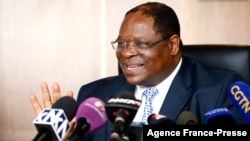Outrage is growing in South Africa against several high-profile global management consultancy and auditing firms after a recently-issued report implicated them in corruption.
The State Capture Commission on Inquiry report said former President Jacob Zuma appointed political allies and private companies to help him take control ["capture'] state-owned enterprises [SOEs]and loot them.
The "Zondo Report," named after Commission head Judge Raymond Zondo, says Zuma appointees uses auditors and consultants to "hollow out" SOES to the point of disfunction and bankruptcy.
In exchange, the firms, including Bain and Company, McKinsey and Company and PricewaterhouseCoopers, raked in hundreds of millions of rands. The named companies deny they intentionally participated in Zuma’s scheme.
The companies implicated in graft acknowledge they made “mistakes” but vehemently deny involvement in financial crimes.
However, the Commission's January report, the first of three expected, states the companies knew they were being used to destroy entities, but turned a blind eye and accepted the work nonetheless.
A former Bain executive, Atholl Williams, whose company denies any deliberate wrongdoing, exposed its alleged collusion in corruption when he testified at the inquiry last year.
“I had to leave the country because of concerns around my safety,” Williams said. “We’ve seen in the last few days two other state capture whistleblowers had break-ins to their homes. We live in constant fear, under constant threat, and there’s no support from our government at all.”
Bain has dismissed Williams’ evidence against it, suggesting he has no “direct knowledge” of how it helped Zuma’s friend, Tom Moyane, “restructure” the South African Revenue Service, or SARS.
“Bain says I wasn’t an employee at the time when they were dismantling SARS, and so therefore we should disregard my testimony. What they don’t say is that my testimony relies on actual Bain documents of work done and conversations that happened that time,” William said.
The documents that Williams gave to the commission appear to show that Bain and Moyane identified highly experienced tax officials who subsequently lost their jobs at SARS. Zuma officials then moved into the posts, and the tax agency began bleeding money.
Bain has not denied that the documents are genuine, adding it may have “unwittingly damaged” SARS.
Lord Peter Hain, a former British parliamentarian who was born in South Africa, is leading an international campaign lobbying for prosecution of corporations allegedly involved in corruption in the country.
Hain described Zondo’s report as a “detailed and damning indictment” of how some private conglomerates collude with governments to steal public money.
He gave some credit to McKinsey and KPMG International who offered apologies, sacked employees and engaged with his office unlike other companies who were similarly implicated.
“With Bain and Company, there’s virtually no admission that something serious went wrong. My advice is simply to come clean to the South African public, admit their guilt and try to put it right,” Hain said.





